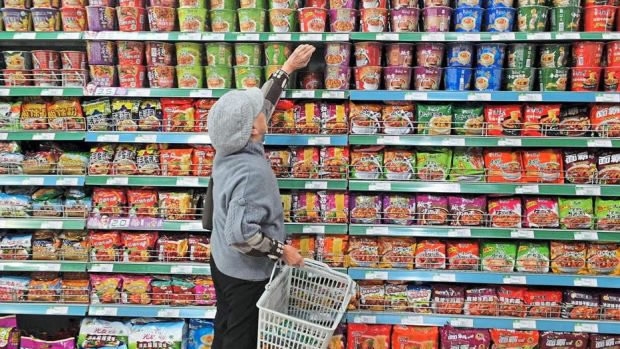
Business
20:50, 24-Oct-2017
Survey: China shoppers rein in spending on cookies to pop drinks
CGTN

Growth in sales of consumer goods ranging from biscuits and candies to toothpaste and shampoo has slowed in China to a five-year low, a survey shows, in a major challenge for global firms seeking to attract buyers in the world’s most populous nation.
Demand for fast-moving consumer goods has waned in the world’s second largest economy, with sales growing two percent in the first half of 2017 versus year-ago levels, a report from consultancies Kantar Worldpanel and Bain & Co shows.
That is the weakest half-year growth since 2012, according to the report based on a survey of 40,000 households. While sales rose 3.6 percent in the third quarter, it is still a far cry from a near 20 percent growth just over half a decade ago.
The data gives a gauge of how China’s consumers are spending their money - key as Beijing’s leaders, global investors, and brands such as Nestle, Procter & Gamble or Coca-Cola look to tap the spending power of the country’s near 1.4 billion potential shoppers.
"The type of consumption people enjoy now is very different - travel, lifestyle, entertainment are all growing strongly," said Bruno Lannes, Shanghai-based partner at Bain.
"(This is) where people are spending, and it’s taking money away from fast-moving consumer goods."
A boom in cheap food delivery - luring huge investment into firms like Meituan-Dianping - has also hit grocery sales as people cook less often at home, Lannes added.
But not all products did badly.
While chocolate, chewing gum and candy saw double-digit drops in sales volume in the first six months, health-focused products like yoghurt and bottled water and some personal care products fared far better.
The Kantar-Bain report offers detailed insights into consumer spending patterns beyond broader official retail sales. The latter also includes data from segments like cars and oil products and showed a rise of 10.3 percent for September.
China - amid a twice-a-decade leadership reshuffle - has posted strong economic growth this year, but this is expected to slow in coming months as higher financing costs and measures to cool the heated property market start to weigh on activity.
Sales of South Korean skin care and makeup products in China fell 4.8 percent in the first half amid a diplomatic stand-off over Seoul’s decision to deploy the US anti-missile system called Terminal High Altitude Area Defense (THAAD) .
For 2017, sales of fast-moving consumer goods in China is expected to be "slightly" better than last year’s 2.9 percent rise, which was the slowest in a decade, Kantar’s China General Manager Jason Yu said.
"We did see some recovery in the third quarter," said Yu. "Really important now is how the fourth quarter performs."
Source(s): Reuters

SITEMAP
Copyright © 2018 CGTN. Beijing ICP prepared NO.16065310-3
Copyright © 2018 CGTN. Beijing ICP prepared NO.16065310-3